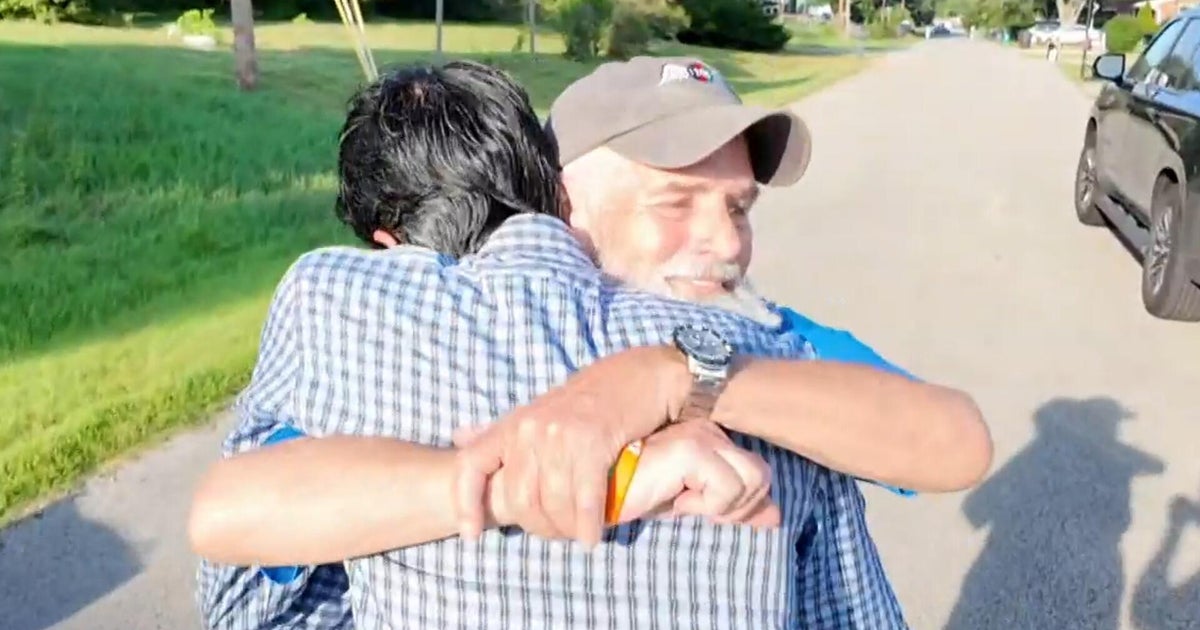
Dewey Yopp, a retired U.S. Army Special Forces officer, was sent to Afghanistan in 2002 to train up a new Afghan army during the early days of the war in Afghanistan. He met Amir, his then-18-year-old Afghan translator, at the airport on his first day there, and says Amir went on to save his life four times.
“Amir dragged me, under fire, to a medevac point,” Yopp told CBS News of one of those instances.
After the U.S. withdrew from the country in 2021, Yopp scrambled to get Amir a special immigrant visa for Afghan allies. Amir asked CBS News to conceal his real name for safety reasons.
“If someone saves your life, your souls are bound together for eternity,” Yopp said. “He’s like a son to me, really.”
Three years later, Amir’s visa was approved, and he and his family were given green cards. They came to the U.S. and settled in Kentucky, reuniting with Yopp 22 years after they first met in Afghanistan.
Yopp now spends most days with Amir’s children, who call him “grandfather.”
Thousands of Afghans living in the U.S. now fear deportation after a federal appeals court late Monday refused to freeze the Trump administration’s efforts to end their legal status. Amir is a Special Immigrant Visa recipient, given to U.S. allies who helped during the war. Despite he and his family having green cards, he still fears being sent back, since the White House has threatened to deport green card holders, too.
Amir risked Taliban retaliation to help American soldiers, because work in Afghanistan at the time was scarce and the prospect of safety abroad was enticing. He told CBS News the promise that was made to him in return for risking his life was, “Your family will go to America. This was promised with all who work with U.S.”
Amir said he went into hiding for years after his service, feeling betrayed by the U.S., until Yopp stepped in to fulfill America’s pledge and helped secure him his visa. Thousands of veterans of the Afghanistan war across the country have taken it upon themselves to help their translators and other Afghan allies come safely to the U.S. and settle here. But Amir says it is not the job of veterans to fulfill the vow of protection the government previously made to them.
The Trump administration has repeatedly targeted Afghan refugees, stopping flights with Afghan allies from arriving, freezing resettlement services, putting Afghanistan on the travel ban list, and ending the Temporary Protected Status (TPS) program for Afghan refugees. Yopp says it is a “moral injury” to veterans to see this happen to those who helped them during the war.
As part of the administration’s efforts to end the TPS program, Homeland Security Secretary Kristi Noem has claimed that Afghanistan is now safe for Afghans to return to, a point Amir disputes.
“OK, if Afghanistan is safe, why are you saying to your citizens, ‘Do not go to Afghanistan?'” Amir said in reference to the State Department’s “Do Not Travel” advisory for Afghanistan. “For me, [it’s] safe, but for you, [it’s] not safe? I’m not sure.”
Amir fears that even as a green card holder, he and his family may be sent back, since the White House has threatened to deport green card holders, too.
These days, he works two jobs, seven days a week, to support his family. He says he only got by in the past because of the $500 a month that Yopp, who is retired, would give him.
“It’s been a slap in the face, really, to see the programs that were in effect, to be taken away,” Yopp said.
Amir added: “Americans should not make a promise with Afghans, and now [you’re] making a problem for them. Then why [did] you make [that] promise?”
